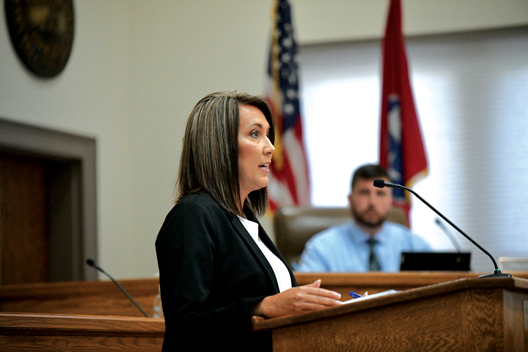Committee votes to implement lagging payroll gradually over 10 weeks
Published 9:44 am Thursday, February 5, 2015
The Carter County Commission’s Financial Management Committee approved a measure Monday that, once implemented, would allow the county to pay its employees a week after a pay period ends.
The Carter County Commission has discussed the issue of lagging payroll, in which employees are paid a week after the end of a given pay period, for more than a decade. The issue first came up during a meeting of the county’s financial management committee in May 2004 at the recommendation of former finance director Jason Cody.
Current Finance Director Ingrid Deloach said the majority of the county’s employees are not on a lagged payroll schedule.
“The school system already lagged their payroll from day one, so they are already doing that correctly,” Deloach said. The only county employees currently lagged are landfill employees, she said.
A lagged payroll system is needed, Deloach said, to create a good business practice and to avoid possible problems.
To allow time for direct deposits to be posted to employees’ bank accounts, time sheets are turned in a few days before each payday. If there is no lag between the end of a pay period and payday, those time sheets must include hours on days that haven’t been worked yet, Deloach said.
Potentially, this could create a problem if an employee has to miss a day due to illness or other personal issue after the time sheet already has been turned in. This does happen occasionally, Deloach said, and when it does, the finance department and the department head must reconcile the employee’s time sheet and adjust it the following pay period.
“There is no money missing. No one has been paid that shouldn’t have been,” Deloach said. “If there was we would have audit findings.”
Despite being discussed numerous times, lagging the county’s payroll has never been passed by the full commission.
“It will probably be brought up again until we do something about it,” Deloach said.
Financial Committee Chairman Ray Lyons said the impact to the employees, the departments and the county as a whole must be considered when deciding whether to implement payroll lagging.
“I know implementing change is a very difficult thing,” Lyons said. “It’s very difficult to get started, but to do that you have to buy in at the top.”
When the county looked into the idea last year, it was not approached in a successful manner, Lyons said.
“At one time, we had the department heads go to their employees and ask them what they thought about it. That is working from the bottom up,” Lyons said. “That is not going to work. You cannot be successful implementing this kinds of change in that matter.”
Carter County Road Superintendent Roger Colbaugh, who serves on the committee, voiced his support for the practice of lagged payroll.
“I’m for lagging,” he said. “It’s just a better way for a manager to track time.”
He said lagging payroll would help his department track employee time and, more specifically, employee overtime. During winter months, especially, Colbaugh’s employees frequently accrue overtime as they have to work to keep roads clear, he said. If time sheets are turned in on Tuesday and a snow storm hits that night, highway department employees have no way to account for that overtime on the correct pay period. The employees are then left waiting until the next pay period before receiving their pay for those overtime hours, Colbaugh said.
Over the years, three different ways to implement pay lagging were discussed, Deloach said. The first was to simply hold pay back one week, but many department heads felt this would put an undue hardship on the employees.
The second option, Deloach said, was to implement payroll lagging gradually over 10 weeks by lagging payroll by one day per pay period until a week’s lag was established.
This staggered approach would minimize the impact on the employees, Deloach said.
“I don’t want to short any employee or impact their family’s livelihood. That is not my goal,” she said. “My goal is just to have a clean accounting system.”
The third method, Deloach said, was a proposal to give the employee’s an one time bonus of a week’s pay so payroll lagging could be implemented without affecting the employees negatively. The estimated cost to implement that proposal was $150,000. That plan was presented to the full Commission in 2014 and failed to garner enough votes to pass.
Committee member Danny Ward said while he supported the idea of payroll lagging, he also felt he and the other new members of the committee needed time to understand all the issues and options before voting.
“We need to have every available argument before us so we can make the right decision for this county,” he said.
Carter County Mayor Leon Humphrey, who serves on the committee, made a motion to implement lagging payroll on the staggered system by delaying payroll by one day for five successive payroll periods to begin on July 1. Humphrey said he felt by implementing it on July 1 that would give employees sufficient time to prepare for the staggered lagging. The motion was seconded by Colbaugh.
Prior to casting his vote, Ward said he did not think bringing up something and asking for an immediate vote was the proper way to conduct county business. Despite his objection to the timing, Ward voted in support of the motion, which passed unanimously.
The measure now will go before the full commission for approval.





